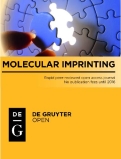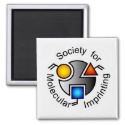|
|
Reference type: Journal
Authors: Lee MH, Thomas JL, Tasi SB, Liu BD, Lin HY
Article Title: Formation and Recognition Characteristics of Albumin-imprinted Poly(Ethylene-co-Vinyl-Alcohol) Membranes.
Publication date: 2009
Journal: Journal of Nanoscience and Nanotechnology
Volume: 9
Issue: (6)
Page numbers: 3469-3477.
DOI: 10.1166/jnn.2009.NS18
Abstract: The recognition of proteins by molecular imprinted polymers (MIPs) is an area of great current interest. Protein-imprinted polymers, or artificial antibodies, with high recognition capability could be used as the sensing material in a protein microarray, or for protein separation for clinical or research applications. However, a great concern in the synthesis of protein MIPs is often the cost of template protein. Surface-based molecular imprinting could offer the advantage of lower usage of template protein, as well overcoming problematic protein solubility in monomers. In addition, the microcontact imprinting method may increase the reproducibility of MIP film formation. In this study, a novel method to prepare the protein imprinted polymers was demonstrated using the phase inversion formation of poly(ethylene-co-vinyl-alcohol), EVAL, membranes with the model protein albumin. EVAL polymer solution (25 wt% of EVAL in dimethyl sulfoxide, DMSO) was cast on glass slides with immobilized template proteins, and MIPs were then solidified by evaporation of DMSO. Several factors were shown to affect the recognition ability of the MIPs, including the template concentration, binding temperature and with the presence of other proteins and biomolecules in the samples
Template and target information: protein, albumin
Author keywords: molecular imprinted polymers, Poly(Ethylene-co-Vinyl-Alcohol), albumin, Recognition
|


 MI cryptic logo iphone3 speckcase
MI cryptic logo iphone3 speckcase







 SMI magnet white
SMI magnet white







 SMI logo hat
SMI logo hat






